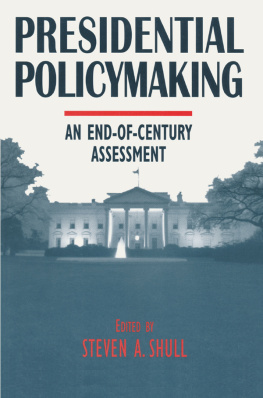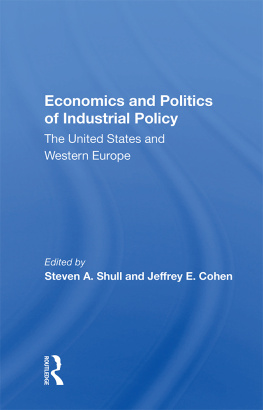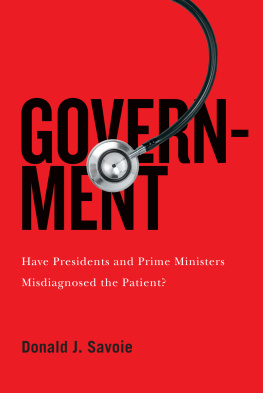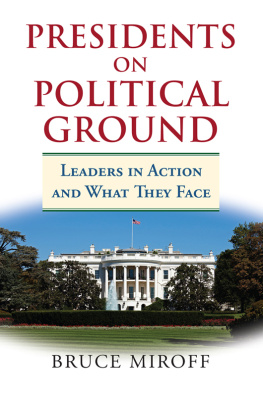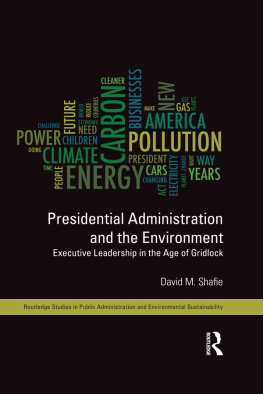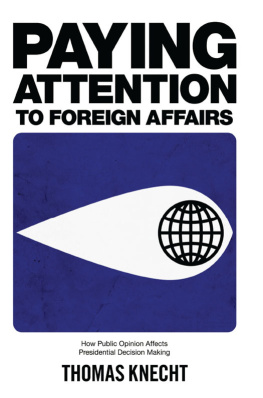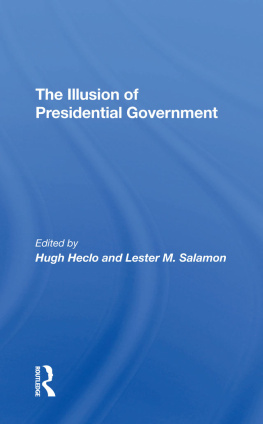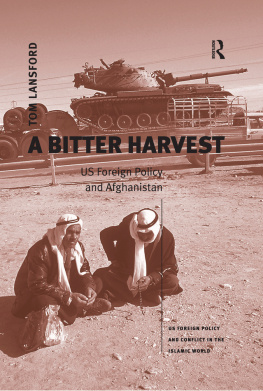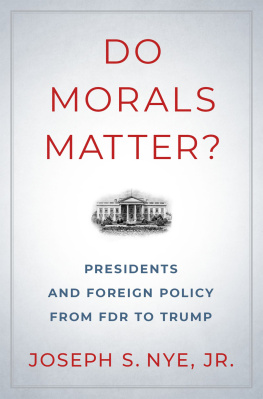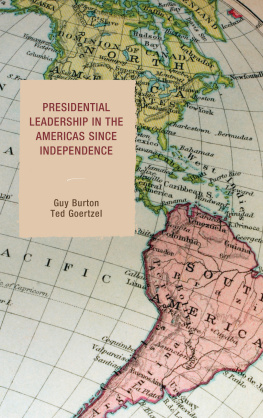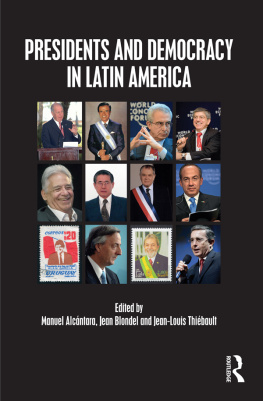PRESIDENTIAL
POLICYMAKING
PRESIDENTIAL
POLICYMAKING
_______________
AN END-OF-CENTURY
ASSESSMENT
EDITED BY
STEVEN A. SHULL
With a Foreword by Norman C. Thomas
First published 1999 by M.E. Sharpe
Published 2015 by Routledge
2 Park Square, Milton Park, Abingdon, Oxon OX14 4RN
711 Third Avenue, New York, NY 10017, USA
Routledge is an imprint of the Taylor & Francis Group, an informa business
Copyright 1999 Taylor & Francis. All rights reserved.
No part of this book may be reprinted or reproduced or utilised in any form or by any electronic, mechanical, or other means, now known or hereafter invented, including photocopying and recording, or in any information storage or retrieval system, without permission in writing from the publishers.
Notices
No responsibility is assumed by the publisher for any injury and/or damage to persons or property as a matter of products liability, negligence or otherwise, or from any use of operation of any methods, products, instructions or ideas contained in the material herein.
Practitioners and researchers must always rely on their own experience and knowledge in evaluating and using any information, methods, compounds, or experiments described herein. In using such information or methods they should be mindful of their own safety and the safety of others, including parties for whom they have a professional responsibility.
Product or corporate names may be trademarks or registered trademarks, and are used only for identification and explanation without intent to infringe.
Library of Congress Cataloging-in-Publication Data
Presidential policymaking: an end-of-century assessment/edited by Steven A. Shull.
p. cm.
Includes bibliographical references and index.
ISBN 0-7656-0259-8 (alk. paper). ISBN 0-7656-0260-1 (pbk.: alk. paper)
1. PresidentsUnited States. 2. Poitical planningUnited States. I. Shull, Steven A.
JK501.P741998
352.23 0973dc2198-8233
CIP
ISBN 13: 9780765602602 (pbk)
ISBN 13: 9780765602596 (hbk)
Dedicated to Norman C. Thomas, Teacher and Scholar
Contents
Norman C. Thomas
Steven A. Shull
James P. Pfiffner
Jeffrey E. Cohen and Ken Collier
Joseph A. Pika
Sidney M. Milkis
Lyn Ragsdale and Jerrold G. Rusk
George C Edwards III
Shirley Anne Warshaw
Richard W. Waterman
Jeffrey A. Segal and Robert M. Howard
Paul J. Quirk and Bruce Nesmith
Lance T. LeLoup
James E. Anderson
Louis Fisher
Mary E. Stuckey
Colin Campbell and Bert A. Rockman
Steven A. Shull received his Ph.D. from Ohio State and is University Research Professor at the University of New Orleans. He has written or edited fifteen books, including Presidential-Congressional Relations, The President and Congress, and dozens of articles in scholarly journals.
James E. Anderson is professor of political science at Texas A&M University. He received his Ph.D. at the University of Texas and is widely published in the areas of public policy and the presidency. His volumes include Public Policymaking and Managing Macroeconomic Policy.
Colin Campbell is University Martin Chair of Political Science at Georgetown University. He is the author or editor of several important volumes on the presidency, including The Clinton Presidency and Managing the Presidency. He received his Ph.D. from Duke University.
Jeffrey E. Cohen is professor of political science at Fordham University in the Bronx, New York. He received his Ph.D. from the University of Michigan and has written extensively on the presidency, including The Presidents Cabinet and Presidential Responsiveness to Public Policymaking.
Ken Collier is assistant professor at the University of Kansas and received his Ph.D. from the University of Texas. He is the author of the recently published Between the Branches: The White House Office of Legislative Affairs.
George C. Edwards III is Distinguished Professor and director of the Center for Presidential Studies at Texas A&M University. He is well known for his work on presidential-congressional relations, including At the Margins and Presidential Influence in Congress.
Louis Fisher is associated with the Congressional Research Service. He received his Ph.D. from the New School for Social Research and has written many books including Presidential Spending Power, Politics of Shared Power, and Presidential War Power.
Robert M. Howard is a doctoral candidate in political science at the State University of New York at Stony Brook and concentrates on studying American political institutions.
Lance T. LeLoup is professor and chair of Political Science at Washington State University. He received his Ph.D. from Ohio State University and has written widely on the presidency and budgeting. His volumes include The President and Congress and Budgetary Politics.
Sidney M. Milkis is associate professor of political science at Brandeis University. He received his Ph.D. from the University of Pennsylvania and is the author of several volumes about the presidency and/or policymaking, including The President and the Parties and Politics of Regulatory Change.
Bruce Nesmith is associate professor of political science at Coe College in Cedar Rapids, Iowa. He received his Ph.D. from the University of IllinoisUrbana and his research interests are American institutions and public policy.
James P. Pfiffner is professor of political science at George Mason University. He received his Ph.D. from the University of Wisconsin and has written extensively on the presidency, including The Strategic Presidency and The Modern Presidency.
Joseph A. Pika is professor of political science at the University of Delaware. He received his Ph.D. from the University of Wisconsin and is coauthor of Politics of the Presidency and The Presidential Contest.
Paul J. Quirk is professor of political science at the University of Illinois. He received his Ph.D. from Harvard and has written widely on the presidency and domestic policy. Professor Quirk is well known for his book, Industry Influence on the Federal Regulatory Process.
Lyn Ragsdale received her Ph.D. from the University of Wisconsin and is professor of political science at the University of Arizona. She is the author of the important reference work, Vital Statistics on the Presidency and coeditor of Political Research Quarterly.
Bert A. Rockman is Research Professor at the University of Pittsburgh. He received his Ph.D. from the University of Michigan and has written widely on the presidency and comparative executives. He is well known for his book, The Leadership Question.
Jerrold G. Rusk is professor of political science at the University of Arizona. He is known for his research on presidential elections including articles in the American Political Science Review.
Jeffrey A. Segal received his Ph.D. from Michigan State University and is professor of political science at State University of New York at Stony Brook. His many works on the presidency and the courts have appeared in

